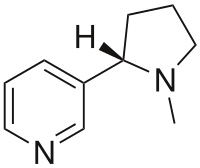
Photo from wikipedia
Sleep disturbances, including insomnia (difficulty falling or staying asleep), are common nicotine withdrawal symptoms particularly during the initial stage of nicotine abstinence, and increase the likelihood of relapse within the… Click to show full abstract
Sleep disturbances, including insomnia (difficulty falling or staying asleep), are common nicotine withdrawal symptoms particularly during the initial stage of nicotine abstinence, and increase the likelihood of relapse within the first 4 weeks of quitting. Although clinically recognized as a key symptom of nicotine withdrawal, sleep disturbances are not addressed in the clinical guidelines for nicotine dependence treatment. Unfortunately, Nicotine Replacement Therapy (NRT) and other pharmacologic interventions do not attenuate withdrawal-provoked sleep disturbances, with several even exacerbating sleep disruption. The present study tested the impact of 30-min of daily moderate exercise, morning versus evening, on key polysomnographic indicators of sleep disturbances during initial 3 days (72 hr) of nicotine withdrawal. Forty-nine daily smokers (53% male) completed 3 separate abstinence periods, during which they completed either morning exercise, evening exercise, or a nonexercising magazine reading control condition. Order of condition was counterbalanced across subjects with a 1-week wash out in between each 3-day abstinence period. Exercise engagement mitigated several changes in sleep architecture associated with acute nicotine deprivation and other time-related effects on sleep, specifically frequency of arousals (B = -2.8, SE = .95; t(1271) = -3.0, p = .003) and reductions in sleep maintenance (B = .58, SE = .21; t(1270) = 2.8, p = .005). Additionally, smokers who reported greater perceived withdrawal severity had the longest latency to fall asleep but experienced the greatest attenuation of this effect following PM exercise. Overall, results suggest a role for exercise as an adjunct smoking cessation treatment to specifically target sleep disturbances during early acute nicotine withdrawal. (PsycInfo Database Record (c) 2020 APA, all rights reserved).
Journal Title: Experimental and clinical psychopharmacology
Year Published: 2020
Link to full text (if available)
Share on Social Media: Sign Up to like & get
recommendations!